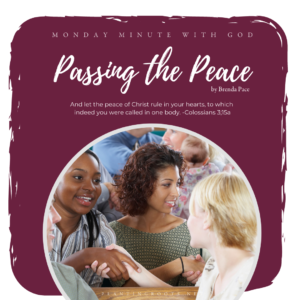
For the final Monday Minute of 2020, Brenda Pace, Planting Roots Senior Advisor, shares the importance of passing the peace. Together, let’s share the evidence of lives lived as followers of the Prince of Peace.
Passing the Peace
Influencing the World for Christ—A post-Advent Reflection
by Brenda Pace
We stand at the precipice of a new year. 2020 is almost history—and we all shout a collective FINALLY! I know I’m not alone in confessing it was a tough year on many levels. As one who has a deep aversion to conflict, 2020 kept me repetitively praying for God’s peace to reign in my heart and mind.
“And let the peace of Christ rule in your hearts, to which indeed you were called in one body.”
Colossians 3;15a
Peace is a word I value. I came to value it even more as a military wife. I daresay no one wants peace to reign in the world more than military families. Am I right?
Before the fall of Adam and Eve, God filled the earth with peace and harmony. After the Fall, man filled the void with violence, corruption, and godlessness. The violence quickly became evident in the way people treated each other. Remember Cain and Abel? Then as now, our relationship with God influences the way we treat one another.
Pass the Peace
I’ve thought often over this past challenging year of the liturgical practice of Passing the Peace. I first became acquainted with Passing the Peace in a military chapel. This custom was not part of my religious tradition, but this peace-loving soul came to love the practice.
In the liturgical tradition, passing the peace comes between the reading of Scripture and communion. Author Tish Harrison Warren, in her beautiful book Liturgy of the Ordinary writes, “Before we come to the Eucharist, before we take the body and blood of Christ, we actively extend peace to the members of the body of Christ right around us. It’s a liturgical enactment of the reality that we cannot approach the table of the Prince of Peace if we aren’t at peace with our neighbor” (p. 78).
Peace be With You
In the most formal tradition the words “peace be with you” are repeated to those seated close by.
My experience has been in a more relaxed setting, greeting and being greeted by as many folks as the pastor/chaplain would allow time. This lover of words finds great significance in the very wording pass the peace which makes this element in a worship service more than a “turn to your neighbor” greeting. The repetitive intentional action has the power to form our hearts as peacemakers.
No doubt the views on culture, worship, and I dare say politics vary among those in a Sunday morning congregation—just like they do in everyday life. Yet, each week the challenge arises to pass the peace to our brothers and sisters. We extend the peace of Christ to one another even with our differences, because Christ extends his peace to us. In reconciling us to himself, we can also be reconciled to one another. In the divisive, polarized world of today, we need to remind one another that we are not alone, and the peace of Christ is ours—both now and forever.
Today, I pray these words activate Hebrews 10:24-25 in you. I write them to stir up love and good works toward peace in your world. I write them to encourage you as you see the Day approaching. May we pass the peace through our words and through our actions in a world that desperately needs to see the results of following the Prince of Peace. Peace be with you, dear sister.
Move Out
Read—Colossians 3:12-17
Reflect—Before we can impact the world with God’s peace, we must practice peace in our own corner of the world.
Respond—How can you better love and live at peace with those in your world? Ask God to show you His way of peace in your life and relationships.
Prayer
Prince of Peace, as I await your coming may I pass your peace in word and deed to each person I encounter. In the name of the Father, and of the Son, and of the Holy Spirit. Amen.
Additional Resources
Liturgy of the Ordinary by Tish Harrison Warren
“The Work of Shalom” by Tish Harrison Warren, Christianity Today, November 2016.





